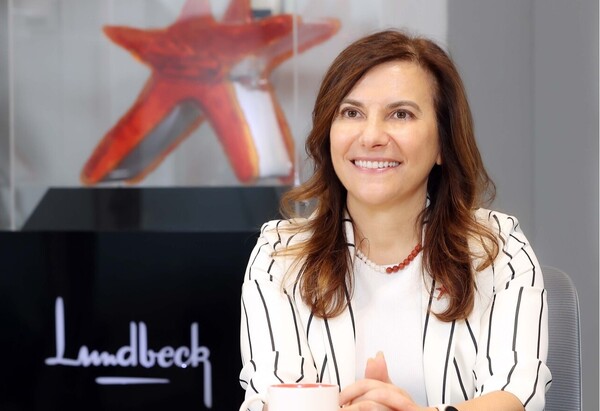Some global pharmaceutical companies seldom fail to put their names on the list of “good places to work for women.” H. Lundbeck A/S, which sells Lexapro, one of the best-selling antidepressants, is one of them.
As a company specializing in various brain disease treatments with a history of over 100 years, Lundbeck is one of the best places for women to work, offering equal opportunities to female workers in various areas, including hiring, wages, and the work system.
Senior Vice President Lorena Di Carlo, who also serves as CEO for Asia after working for nearly 30 years for Lundbeck, visited Korea on the occasion of “International Women’s Day.” The United Nations designated March 8 as International Women’s Day to guarantee equal rights for female workers, holding various events.
Korea Biomedical Review met with CEO Di Carlo to learn about female workers’ role and working environment in the company, and depression, which is the company’s main area of treatment and disease to which women are more vulnerable.
According to World Health Organization, the prevalence of depression was 5.1 percent for women, about 1.4 times higher than 3.6 percent for men. In the mental health survey announced by the Ministry of Health and Welfare in 2021, depression disorder’s prevalence was 2.4 percent for women, about 2.2 times higher than men’s 1.1 percent.

Question: We understand you’ve been with Lundbeck for about 28 years. We are curious about what attraction of the company has made such a long stay possible.
Answer: I have worked for a "longish" period at Lundbeck. I started work there in 1995, meaning it would be 29 years this August. Lundbeck has more than 100 years of history, but it has mainly operated in Europe. In the mid-1990s, the company decided on global expansion, and one of the areas was Canada, where I lived. In other words, I joined Lundbeck when it began to expand globally. Thanks to that, I could take on some very exciting tasks. I have worked in six countries for nearly three decades and have been working in Singapore since last year as the CEO for Asia. Opportunities like these are rare. I think Lundbeck has a culture that respects employees, especially women, providing them with ample opportunities.
Lundbeck is especially attractive as a company that resolves “mental health.” I had family members with Alzheimer’s or Parkinson’s, which motivated me to work in the brain disease area.
Another attraction is that the company is well-localized, although its business stage is the entire world. It provides services that meet the needs of local patients and medical workers. Korea is one such country. While working on various global projects and campaigns at the headquarters level, I also carry out various product promotions and campaigns needed for Korean patients and medical professionals.
Q: You are visiting Korea to celebrate International Women’s Day. What is women’s position in Lundbeck?
A: Lundbeck is a good example armed with female leadership. The share of women is quite high by global standards, too. In the case of Lundbeck Korea, the gender ratio is equal, with 5 to 5. Overall, male employees are slightly higher, but more women are in leadership. The same was true in Lundbeck China where I worked as a managing director. At the time, 100 percent of Lundbeck China’s executives were women. In Lundbeck Singapore, where I am now, women take a far larger share of managers. I have pride in Lundbeck’s high ratio of employing women.
Q: What’s as important as the equal gender ratio is the quality of employment. We wonder whether any restrictions exist due to pregnancy, childbirth, and raising children. We are also curious about women’s working environment in your company.
A: Of course, the quality of female employment is influenced by host countries culture. I understand there is a culture in most Asian countries, including China, where working couples receive their parents’ help rearing children. To solve this problem, Lundbeck actively introduced a flexible working system and environment, including working from home. Especially in metropolises like Seoul, traffic jam is very severe, so I am considering introducing a plan that allows workers to drop kids off in the early morning and pick them up in the evening, working for the time in between.
Fortunately, people have accepted remote work and working from home more easily as they got used to them. In addition, much-related technology was developed and accelerated during the Covid-19 pandemic. As a result, women’s childcare is less affected by business trips, which can influence their career development or a balance between career and family. Such costs can also be allocated to other necessary areas. Lundbeck continues to provide various female support programs to provide a flexible work environment for women’s career development and a better work-life balance based on technology developed during Covid-19 and the management’s efforts.
Q: What other specific efforts is Lundbeck making for women?
A: On this year’s International Women’s Day, we held a small event sharing flowers and bread. We conducted a campaign for female executives and employees on International Day of Women and Girls in Science in February. Although the number of women is far smaller than men among students in scientific fields, we told them stories of science and R&D, stimulating curiosity and conveying educational information on how science affects the human brain, body, and psychology. Besides, Lundbeck focuses on improving the awareness of women’s health, especially mental health. For example, we conduct a companywide campaign to improve related awareness on World Mental Health Day in October every year.
Q: You joined Lundbeck as long as three decades ago. Then you must have watched how the awareness of “mental health” has changed during the period.
A: Not many people knew about the company when I entered Lundbeck. However, I could know many people used its products, including Lexapro. Afterward, an increasing number of people knew about Lundbeck products anywhere in the world. In other words, more and more people “were saying” they used Lundbeck products. That was why I could predict more people would be able to talk if they experienced brain diseases. After confirming it in many countries for over 20 years, my prediction has proved true. There is still some “stigma” related to mental health diseases, but people’s thinking is changing gradually.

Q: Korea dominates the world in the suicide rate and has a high prevalence of depression. Still, the “stigma” about mental treatment remains unchanged. How does Lundbeck assess the Korean market?
A: Social sentiments that make it hard to come out with mental diseases due to stigma are seen in many Asian countries, including Korea. However, statistics show a gradual improvement in related matters.
Particularly, many people have come to pay greater attention to mental health as they undergo the Covid-19 pandemic. As a result, there is an atmosphere where people think it is natural and okay to feel anxiety or additional stress after a difficult period.
From the standpoint of many pharma companies, including Lundbeck, and the medical community, we could see the green light in improving awareness of mental disease from people’s discussion with a more open way of thinking. Also, we understand the Korean government is making many efforts by launching suicide prevention associations and organizations and conducting various public education campaigns. For these reasons, we expect the market situation to turn for the better gradually.
Q: Depression occurs more in women, including Korean women. Why?
A: As you pointed out, depression is far higher among women than men, and its treatment rate is the same. This is a trend shown consistently worldwide. In the case of Korea, in particular, two-thirds of depression patients are women, as I know. There may be various reasons for the far higher occurrence of depression among women, the first one is biological. Women tend to develop depression affected by hormones according to their life cycle, including menopause.
Second, there are social and cultural reasons. Social sentiment and culture, which puts housekeeping and childcare ahead of work, can pressure women. In some countries where changes and innovation occur very rapidly, like Korea, there is social pressure to produce work harder and produce better results more rapidly, which is another reason, I guess.
Third, women tend to ask for help more openly than men. Men also experience depression but do not express it openly, failing to receive specialist advice or get treatments. That also affects medical workers, making them perceive women’s depression symptoms more easily than men’s because women express them more actively and easily. That, in turn, affects the difference in prevalence.
Q: Let us know if there are other activities or efforts Lundbeck is starting to improve the awareness of depression.
A: Depression is a serious disease that sharply raises the possibility of suicide. Accordingly, it should be treated seriously, as seen by extensive efforts made by many government officials and medical professionals. Lundbeck Korea is also conducting suicide-prevention campaigns and making other efforts to improve awareness of depression.
Lundbeck is supplying Brintellix, a new antidepressant that improves cognitive function, to the Korean market. In treating depression, most focus on moods. However, even if moods improve, various other symptoms can remain, such as a dizzy head or poor concentration. Brintellix is an antidepressant that improves moods and cognitive disorders. As Korean women simultaneously play several social roles by doing work, housekeeping, and childcare, such cognitive function improvement is more important. Lundbeck Korea and I are proud of our product playing an important role in Korean society, where women’s depression prevalence is high.
Q: Lastly, what is your plan in Korea?
A: Lundbeck is the only global pharmaceutical company focusing on brain diseases. Brain diseases are a very difficult area that numerous companies have challenged and abandoned. Lundbeck’s pipelines show this company concentrates on nerve and brain diseases. In Korea, too, it is releasing only products related to depression, Parkinson’s, and Alzheimer’s.
We are also planning to introduce Eptinezumab, a migraine treatment. Migraine is also one of the diseases with a prevalence far higher among women. It has been released in the U.S., and some other markets, but clinical trials still occur in Korea and other Asian countries. We are preparing to win its approvals in a few years.

